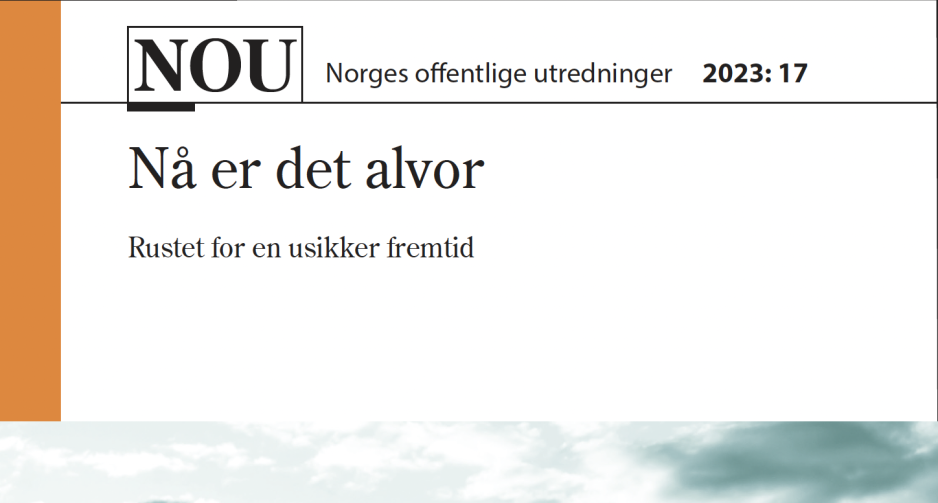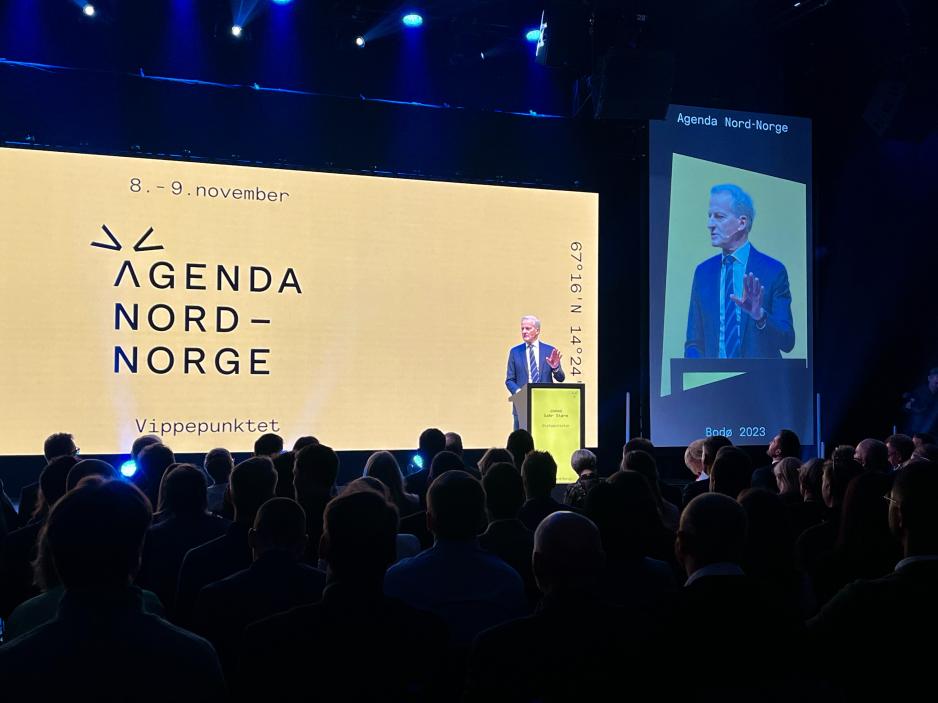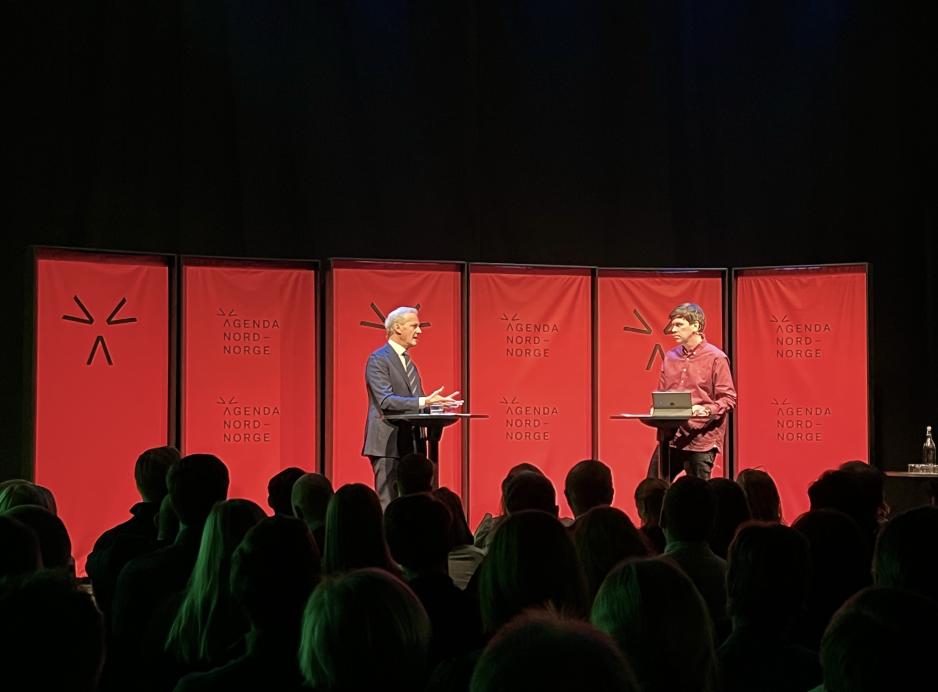Agenda Nord-Norge 2023: Norwegian PM: Shares the Total Preparedness Commission's Understanding of Severity

Norway's Prime Minister Jonas Gahr Støre (Labor) participated in the Agenda Northern Norway 2023 conference in Bodø this week. (Photo: Sparebank 1 Nord-Norge)
Bodø (High North News): "I agree with the Total Preparedness Commission that the situation is severe," says Norwegian PM Jonas Gahr Støre. At the same time, he does not consider the situation acute and emphasizes a systematic, more long-term approach to preparedness in the North. Nor will he hand out war-preparatory leaflets à la the Swedish ones.
This is serious, emphasizes the Norwegian Total Preparedness Commission, and maintains that "strengthened preparedness in the North is of particular significance."
Norway's PM Jonas Gahr Støre (Labor) and his government have now had time to let the commission's report, presented this summer, sink in.
So the question is: How does the prime minister face this severity in the North?
"I agree with the Total Preparedness Commission that the situation is severe. This is the case in the whole of Europe and in Norway, which borders Russia, that is waging war against another neighboring country. The Total Preparedness Commission and the Defense Commission's reports have now had official hearings. In the time coming, we will summarize this in the work with both preparedness and defense plans," says Støre to High North News at the Agenda Northern Norway conference this week.
Wide spectrum
"This government has been concerned with strengthening the military Armed Forces' operative ability and hiring more people from day one. We have introduced many measures within the defense sector. Still, the Toal Defense Commission points to the interaction between the civil society and the emergency services – which we must always work on," the PM points out and continues:
"In the North, strengthened preparedness also includes stopping the depopulation and increasing the desire to stay. This work must be done in many different areas – from developing welfare services, such as free childcare in Finnmark and Northern Troms and cheaper child care for all, to more affordable flights. Many individual measures are needed."

The front page of the Total Preparedness Commission's report with the following title: "This is serious. Prepared for an uncertain future". (Screenshot)
Does not demand urgent measures
"The demographic development, the long distances, and the security policy significance of the area makes the High North more vulnerable to unforeseen events – and contributes to some preparedness challenges being more apparent and urgent in this region compared to the rest of the country," writes the Total Preparedness Commission.
The migration from Northern Norway continues, and those who chose to live in the region are becoming older. The tipping point with more inhabitants over 65 years than under has already been reached in Nordland county – with Troms and Finnmark county close after, shows the Economic Survey for Northern Norway 2023 (Norwegian only).
Does the government have plans for any new measures to strengthen civil preparedness in the North that could have a quick effect?
"This is not a situation that is about urgent measures. It is generally about strengthening the preparedness and endurance of the entire country when it comes to handling crisis situations – which can come from climate change and extreme weather, but also from the security policy situation," the prime minister replies.
"I would like to warn against single measures being brought forward with great haste. It is important to think systematically here. Among other things, we must find good answers for the situation in the Northern Norwegian healthcare sector to ensure equal and safe health services. This is an important and prioritized task for the government. We must use the time we need to arrive at good solutions."

"There are challenges to be solved in the Northern Norwegian healthcare sector. It will require a will to fund and a will to educate people to work in healthcare in the North. We cannot keep living with so many vacant posts. Health is so important for both the desire to stay and to work," says PM Støre in his speech at Agenda Northern Norway.
The health sector preparedness
Health preparedness in the North is an especially relevant topic since the Northern Norway Regional Health Authority is currently reviewing the division of functions and tasks between the region's hospitals.
Among other things, cuts in emergency and maternity services are being considered at several Northern hospitals, from Kirkenes in the far north-east at the Russian border to Helgeland in the south.
"The challenges in the North are greater than in other parts of the country. We have 1000 vacant posts and strained finances. The Northern Norway Regional Health Authority must conduct a review of the situation – which they have been tasked with and which is completely right of them to do. And then we will make decisions consequently," says Støre.
Next Tuesday, the Northern Norway Regional Health Authority's working groups will present its recommendations. These will be included in the basis for designing a comprehensive plan, which the board of the health company will decide on on December 20th. The plan will then be submitted for hearing, and the board will make a final decision in late April.
Calls for more national attention
The Total Preparedness Commission believes that health preparedness in the High North requires special attention in light of the region's security policy significance and its dependence on air transport. It therefore calls for clearer national guidelines and ambitions for health preparedness.
The commission recommends specifically that national security and defense ability be included in the basis of assessment when hospital structure and health preparedness in Troms and Finnmark are reviewed. Will this be used as a premise by the government?
"I believe that is an important perspective. The entire preparedness and security need must be seen in context when we plan transport, health, and energy. I can confirm that, but we have to come back to the specific solutions," says the prime minister.
Also read (Article continues below)
National action zone
The Total Preparedness Commission also recommends that a national "action zone" be established in Finnmark and Northern Troms based on NATO's seven Baseline Requirements for resilient critical societal functions.
Among other things, resilience is expected in health and other critical public services, energy supplies, food and water, as well as communication and transport systems.
"Such an action zone must include an economic action package to strengthen the public sector, infrastructure, research, education, and the business sector, in the region," writes the commission.
What is the government's response to this recommendation from the commission?
"The commission's report has recently been on hearing, and there already exists an action zone in Finnmark and Northern Troms to better facilitate settlement and business activity in the region. Within this zone, we have done several things, such as ensuring free childcare and increasing deductions for student loans.We have also introduced a package to develop more energy and grid capacity in Finnmark. It is very important for all the issues we now are discussing that there is enough power for both existing and new business activity. This is again an illustration of the need to work systematically," maintains Støre.
Here it can be added that, despite the existing action zone, the Total Preparedness Commission finds it "necessary to invest across sectors to stimulate activity and to strengthen preparedness in the area."
Tax measure?
In such a systematic review as you outline, will a measure such as removing large parts of the income tax in the whole of Northern Norway be taken into consideration?
"We have several measures in relation to tax and employer's contribution in the North, but this kind of measure is not something we are specifically considering at the moment."

Prime Minister Støre is interviewed by Amund Trellevik at the Agenda Northern Norway 2023 conference. (Photo: Astri Edvardsen)
Toned down preparedness rhetoric
On stage during Agenda Northern Norway, Støre also gets a short but serious question from debate leader Amund Trellevik: Is Norway ready for battle?
"A few years ago, a former chief of defense said that Norway lives in deep peace. Isn't that good? No, because deep peace is more like a state of sleep," says the prime minister and continues:
"I believe that we should not tell our countrymen and women that we should prepare for war. But the preparedness authorities have encouraged people to think through what they have in the kitchen or the pantry. One should have extra water and canned food if a crisis arises due to extreme weather or other things. Many will have received brochures in the mail with this good advice on self-preparedness."
"In Sweden, I have heard that the phrase 'when the war comes' is used in similar brochures. If we had sent out brochures in Norway today with text such as 'Here are some good tips for when the war comes,' it would not match how we perceive the situation. But issues in today's world around climate, extreme weather, and security mean that we have to think about some new thoughts – without us becoming excessively restless for that reason."
However, the Chair of the Norwegian Defense Commission, Knut Storberget, believes that Norway should follow the neighboring Nordic countries in taking the seriousness more to heart – and has, among other things, pointed to the Swedish brochures.





